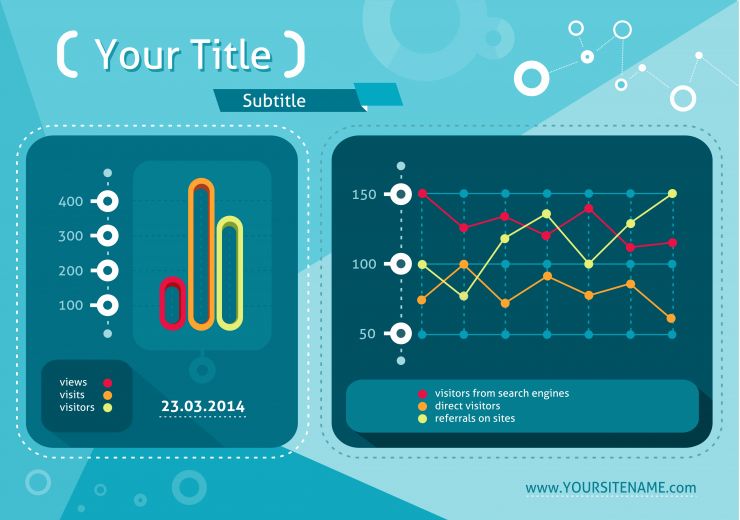How To Guides : Marketing Analytics
How Digital Marketing Reports Automation Works?
Oct 08, 2018
Automation is the technology by which a process or procedure is performed without human assistance. Automation can be performed in many ways in var...

Google Analytics is a free web analytics service offered by Google to offers tools to help you analyse your website traffic data for marketing purposes..
Google Tag Manager is a free tool that makes it easy for marketers to add and update website tags — including conversion tracking, site analytics, remarketing, and more—with just a few clicks, and without needing to edit your website
Google Analytics allows you to measure the results of individual campaigns like SEO, Google Ads, etc. in real-time, compare the data to previous periods, and so much more.
Google Tag Manager becomes very helpful when you have lots of tags to manage because all the code is stored in one place. A huge benefit of Tag Manager is that you, the marketer, can manage the code on your own.

Universal Analytics uses a different tracking code than Google Urchin, Google Analytics, and Google Tag Manager.

Google Tag Manager uses a different tracking code than Google Urchin, Google Analytics, and Universal Analytics.

The data processing in UA is visitors based instead of visit (sessions based). This is not the case with Google Analytics, Classic and Google Urchin. Apparently, Universal Analytics is visitors centric rather than visit centric.
Data integration across multiple channels is not possible in Google Urchin and Google Classic, but you can integrate data across multiple devices and platforms through Google Universal Analytics.
Google Urchin and Google Classic does not allow you to define your own dimensions and metrics, but you can create and use your own dimensions and metrics to collect types of data in Universal Analytics. In Universal Analytics, through custom dimensions, you can import additional data into your analytics account.
Google Analytics and Google Urchin can use up to 7 cookies (_utma, _utmb, _utmc, _utmt, _utmz, _utmx, _utmy) to collect visitor’s usage data. Now _utmc cookie is not used in ga.js anymore but is still set on the user’s hard disc for interoperability with urchin.js and _utmc cookie expires as soon as you close the browser window. Universal Analytics can use only 2 cookies (_ga and_gat).
Google Urchin and Google Analytics use custom variables instead of custom dimensions as custom dimensions are not available in Google Analytics. Universal Analytics uses custom dimensions instead of custom variables though custom variables are still available in Universal Analytics.
To use all features of Universal Analytics, you require good technical knowledge as compared to Google Classic and Google Urchin.
If you don’t have good technical knowledge, you will have a hard time using custom dimensions, custom metrics, and integrating data across multiple device and platforms.
In Universal Analytics, from e-commerce tracking, event tracking to cross domain tracking is implemented differently.
The user interface of reports for Universal Analytics, Google Urchin and Google Analytics look the same. The difference is only how to collect, integrate, and process the data and once you start using custom dimensions and custom metrics, Universal Analytics reports start looking different from the Google Analytics, and Google Urchin report.
Universal Analytics provide advance e-commerce tracking called enhance e-commerce. E-commerce tracking is not available in Google Analytics and Google Urchin.
Google Analytics tags (Urchin, Classic, and Universal) is basically for generating the reports and statistics about your website. A report provides statistical data like how many people visited your website, what are the sources and medium, what browser and devices they used, which pages are popular, etc. This can happen once you put the tag is the JavaScript code on all of your website pages. Once a user comes to your site, that script runs on the page loading time and let the Google Analytics servers know that they are visiting the site right now. In case you want to track how many people visited a specific feature and maybe you want to group a set of pages together or count some similar but different URLs as being the same page. Now you need unique tags for all these different features and groups of pages, so that Google can identify which feature or type of page got used or visited. Now it's complicated! You have multiple tags, and you only want the tags to "fire" sometimes (e.g. don't fire unless they click this button or use this feature.) Google Tag Manager makes it easier to deal with this chaos of tags by giving you chance to define rules for when your tags should fire.
It additionally lets you test your tags to ensure they go off when you load the correct page or click a certain button. This is done by putting the Tag Manager's code on your website instead of the actual tags, the tag manager outputs the tags for you. Google Tag Manager gives you another advantage that you can change your tags and the way they work without changing the source code of your website instead you just change it from the Google Tag Manager website, and it will give a different code on your pages dynamically when they're loaded in the visitor's browser. So, we can pass information from one data source like a website to another data source like Analytics through Google Tag Manager.
Universal Analytics is the latest Google analytics tracking code used to track your website. This comes with features like User-ID to collect engagement data on various platforms, collect data from any digital device using analytics SDKs, features like custom dimensions and metrics, enhanced e-commerce tracking and enhanced configuration options. Google Urchin is the oldest version of Google Analytics tracking code, now deprecated.
With Google Tag Manager, you can deploy various types of tracking code on your site, including Google Analytics Classic, Urchin, and Analytics.


How To Guides : Marketing Analytics
Oct 08, 2018
Automation is the technology by which a process or procedure is performed without human assistance. Automation can be performed in many ways in var...


How To Guides : Marketing Analytics
Sep 28, 2018
A goal in simple language means what you want to achieve or your targets. If we talk in terms of a website, it signifies the whole activity called...